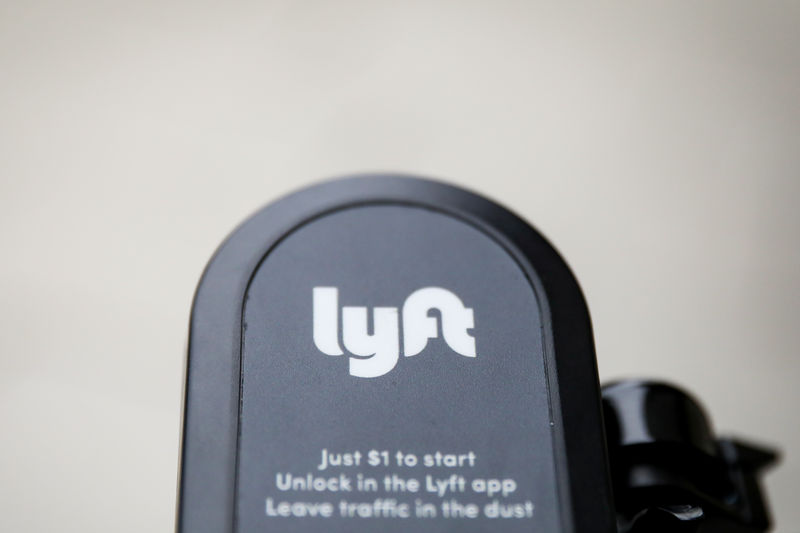Investing.com - Here’s a look at three things that were under the radar this past week.
1. Lyft Catches a Ride From Its Pals
Buy Lyft (NASDAQ:LYFT). This was the verdict earlier this week from a slew of Wall Street banks involved in Lyft's initial public offering. But that did little to improve sentiment on the ride sharing company, as its stock fell for the fifth-straight week.
Under regulations, deal underwriters had to wait 25 days following Lyft's IPO to give their opinion on the stock, which has collapsed more than 30% since its stock market debut on March 29.
The bulk of the banks who worked on Lyft's IPO, unsurprisingly, gave the company the thumbs up.
Morgan Stanley turned out to be the chief cheerleader for the stock, waxing lyrical about Lyft's potential to tap into a large and underpenetrated market valued at $745 billion.
The bank, which slapped an outperform rating and a $95 price target on shares of Lyft, is also betting that the era of autonomous driving will prompt drivers to give up car ownership, spurring ride-sharing adoption.
But other banks painted a more somber picture on Lyft, highlighting concerns over its fuzzy valuation, the potentially stretched IPO price and the upcoming listing of larger rival Uber (NYSE:UBER).
“It’s when companies are growing fast but losing a lot of money, and we don’t know when it’s going to stop,” said Kathleen Smith, a principal at Renaissance Capital. “That means they’re really hard to value. A lot of the trading in Lyft had to do with that it’s popular.”
“We expect steady deceleration in market growth and Lyft’s pace of share gain, which seems likely to prevent revenue and adjusted EBITDA from meaningfully exceeding our expectations,” said KeyBank analyst Andy Hargreaves.
2. Is This Market too Hot or too Cold?
With all attention on corporate earnings this past week, investors shouldn’t ignore risks to the U.S. economy, according to the monthly The Ghost in the Machine research note from ADM Investor Services.
There are three bears to beware, according to Blu Putnam, managing director of strategic intelligence and chief economist at CME Group and a contributor to ADM.
Interest rates, tariffs and the U.S. debt ceiling all pose threats, Putnam wrote.
The worries are:
- The Federal Reserve seems overconcerned about keeping its rate-setting powder dry.
- Any deal with the U.S. and China might retain tariffs, which would lead to an equity selloff. President Donald Trump’s budget targeting cutbacks in Medicare and Social Security disability payments is “guaranteed to provoke Congressional gridlock,” putting a government shutdown and technical U.S. default in September on the table.
- While both scenarios are low probability, the prospect of either could cause a flight to quality in Treasuries, he said.
3. Delivery?
Domino’s Pizza (NYSE:DPZ) shares jumped after the company reported better-than-expected earnings this past week. But the company might also have dented demand for the hottest IPO in town.
On the conference call, Domino’s CEO Ritch Allison was adamant that the company wouldn’t look to partner with a third party for deliveries, like Uber Eats. (Hat tip Jonathan Maze of Restaurant Business Magazine.)
“I don’t see any need for us to go onto third-party (delivery) platforms,” Allison said. “It’s not clear why I would want to give up the franchisee’s margin or data in the business and give it to someone who would ultimately use it against our business.”
That makes sense for a food delivery pioneer like Domino’s, but it does raise concerns about a highly-touted part of Uber’s business that some investors are already skeptical about.
According to the company’s initial IPO filing (S-1), revenue for Uber Eats peaked in the second quarter of 2018 at $218 million, compared with rideshare revenue of $2.26 billion. Uber Eats revenue was $191 million in the third quarter and $165 million in the fourth.
In a sign of instability for the company now on its IPO roadshow, McDonald’s (NYSE:MCD) recently met with Uber Eats to negotiate lower the fees it pays and end its exclusive deal, Bloomberg reported, citing a McDonald’s internal memo.
The fast food giant wants a new deal with “significantly reduced commission rates for all U.S. restaurants,” that will also let it work with delivery companies like Grubhub (NYSE:GRUB) and DoorDash.
